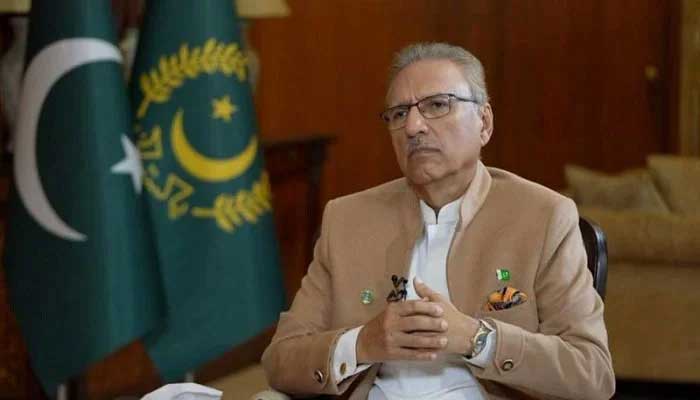President Arif Alvi returns Supreme Court bill for 'reconsideration'
President Arif Alvi says Supreme Court (Practice and Procedure) Bill, 2023, was beyond parliament's jurisdiction
ISLAMABAD: President Arif Alvi returned on Saturday the bill limiting the chief justice's discretionary powers to take suo motu notice, to the parliament for review as per the provisions of the Article 75 of the Constitution, in order to meet the scrutiny about its validity.
In his letter to Prime Minister Shehbaz Sharif regarding the bill, the president said that the Supreme Court (Practice and Procedure) Bill, 2023, prima-facie travels beyond the competence of the parliament and can be assailed as colourable legislation.
The president said that he thought it fit and proper to return the bill, in accordance with the Constitution, with the request for reconsideration in order to meet the scrutiny about its validity (if assailed in the Court of Law).
The letter highlighted several aspects, which in his opinion, required due consideration.
President Alvi said that SC Rules 1980 had been "made and in force duly validated and adopted by the Constitution itself" under enabling provisions such as Article 191 of the Constitution which empowers the top court to make rules regulating the practice and procedure of the court.
"These time-tested rules are being followed ever since the year 1980 — any tinkering with the same may tantamount to interference with the internal working of the Court, its autonomy and independence," the letter stated.
The second aspect that the president said needed reconsideration was the separation of powers.
"Our Constitution is founded on the concept of trichotomy of power – three pillars of the State whose domain of power, authority and functions are defined and delineated by the Constitution itself".
Alvi stated that Article 67 gave the parliament the power to "make rules for regulating its procedure and the conduct of its business[...]". Meanwhile, under Article 191, the Supreme Court “may make rules regulating the practice and procedure of the Court”.
"Articles 67 and 191 are akin to each other and recognise the autonomy and independence of each other respectively — barring interference of one into the other’s domain," the letter read.
Moreover, the president observed that the apex court was an independent institution as visualised by the founding fathers that in the state of Pakistan “independence of the judiciary shall be fully secured”.
With such an objective in view, Article 191 was incorporated and the Supreme Court was kept out of the law-making authority of the Parliament, it added.
Furthermore, the letter underscored that the competence of the parliament to make laws stems from the Constitution itself.
"Article 70 relates to ‘introduction and passing of Bills’ with respect to any matter in the Federal Legislative List — enumerated in the Fourth Schedule of the Constitution."
It added that the top court was specially excluded under entry 55 of Part I of the Fourth Schedule, which empowers the Parliament to make laws in respect of the "jurisdiction and powers of all courts except the Supreme Court".
"The Constitution confers the Supreme Court with Appellate Jurisdiction (Articles 185 – 212), Advisory (Article 186), Review (Article 186) and Original Jurisdiction (Article 184). Article 184(3), the focus of the Bill relates to the original jurisdiction of the Court — providing for the mode and manner for invoking it and providing Appeal," the letter read.
It asked if such a purpose could be achieved without amending the provisions of relevant Articles of the Constitution, while keeping the fact in view that such amendments cannot be made under "an ordinary law as the Constitution is a higher law – father of laws".
"A Constitution is not an ordinary law, but rather an embodiment of fundamental principles, higher law, and law above other laws," the letter concluded.
Minister assails Alvi
Federal Minister for Climate Change Sherry Rehman slammed Arif Alvi for returning the bill, saying it proved that he is not the president of the country but is still the secretary general of Pakistan Tehreek-e-Insaf.
He has seen every decision of the parliament from PTI's point of view. Rehman said that he had given his view on the bill in an interview even before receiving it.
He is following his party policy, not the constitutional position of the president.
-
Security forces gun down 30 terrorists in multiple IBOs in KP: ISPR
-
MQM-P calls for new province in Sindh
-
US report validates Pakistan military edge over India: PM
-
Banned TTP poses serious threat to Pakistan security: UNSC panel
-
CM Afridi clarifies remarks on by-poll after ECP requests army deployment
-
Dubai sees 3.2m Pakistani passengers in 2025 as airport sets new milestone
-
Security forces kill 23 Indian proxy terrorists in KP's Kurram
-
Pakistan to construct island to boost oil exploration: report












